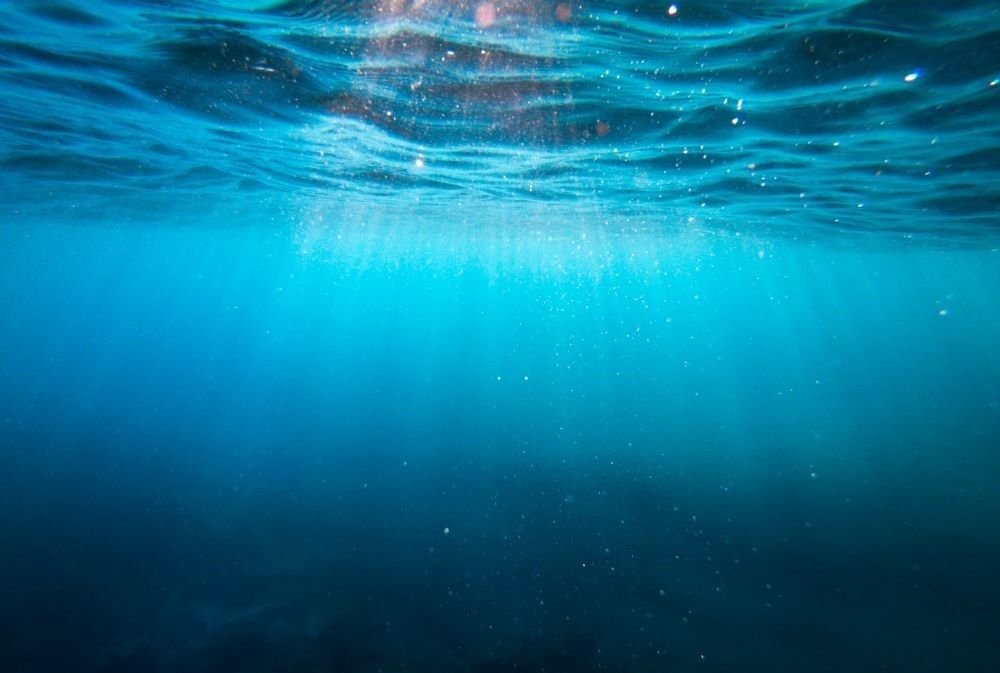
(Unsplash/Cristian Palmer)
I watch the diver, face uplifted above the water, nose-clip securely sealing her nostrils, as she takes her last gulps of air before turning and plunging headlong into the Vertical Blue Hole. She darts downward alongside the elongated rope like an arrow intent on reaching its target. In this case, her target is well below 120 meters, where she must pull a card to prove she's reached her goal and then glide up toward the surface. She's racing against time, both to claim the world record and to reach oxygen before she blacks out.
The freediver is Alessia Zecchini of Italy, and since the Netflix documentary "The Deepest Breath" was filmed, she has set the women's freediver world record, diving 351 feet straight down into the ocean — all the while holding her breath.
This feat both fascinates and frightens me.
Although I was raised in Massachusetts, near Narragansett Bay and the Rhode Island border, where you're sure to encounter some body of water at every turn, I'm afraid of going under water. I spent summers hanging out with family and friends at beaches, bays and ponds, cooling off in ocean temperatures often no warmer than 68 degrees. Yet, unbelievably, neither I nor my siblings ever learned to swim.
As a child, the best I managed was briskly lifting my feet off the ocean bottom and clumsily dog paddling with the current while my sisters or godfather hovered over me, each time displaying a bout of courage as brief as a New England heat wave.
Eventually — I don't remember at what age — I garnered enough boldness to lean back and let the salty waves lift and carry me along. With my face turned toward the sun, the water licking my ears, I felt as though I’d accomplished something grand and very grown-up. I'd learned to let go of my timidity, and trust. The ocean would carry me after all.
But I remained fearful of holding my breath underwater.
There's no place I need to go. Nothing to attain. God is already, and always, here. Breathing through me, within me, in the depths of my being, just as Job professed.
Until, at age 18, I developed a crush on our community pool's lifeguard that instilled enough bravado in me to overcome that fear. He was offering diving lessons, and since I wanted to get closer to him, it seemed reasonable to let him teach me how to plunge headfirst into the deep end of the pool. My infatuation proved to be enough of a motivator: Although I mostly belly-flopped, I also managed some decent dives.
There have been few motivators as strong since then. And as I've aged, my fear of holding my breath underwater has only intensified. I doubt anything would get me to drop into the deep end now.
That's why I’m surprised to be drawn to "The Deepest Breath," a movie about freedivers hoping to break world records. Filmed in the Bahamas, at Dean's Blue Hole, an underwater cave with a maximum depth of 492 feet, the cinematography mesmerizes me as I watch each diver descend.
It is deep, dark and dangerous. One can become disoriented; lose consciousness on their way back to the surface. Yet down, down, down each diver sinks into the depths.
It seems unbelievable. Both their ability to hold their breath for so long and their desire to do this.
Natalia Molchanova, a Russian freediver champion — who, at the time of filming, held the most world records — tries to explain the attraction of this "sport." At 30 meters, she says, the pressure pushes the diver down and the freefall begins. It's the point where thinking must end and surrender begins. As she descends, she enters a singular silence, unlike anything she's ever experienced. Natalia compares it to deep meditation. The secret is to abandon your thoughts, your worries, your expectations of accomplishing a goal.
It sounds a lot like my centering prayer practice.
Aren’t I constantly abandoning my agenda, releasing thoughts, and returning to my sacred word, as I sit in silence every day? Yet don’t my endless thoughts also sometimes send me scurrying back to the surface, gulping for air?
Although this unique silence intrigues me, I feel my resistance as Natalia speaks into the camera, advising young Alessia not to stress over succeeding but rather to relax into the silence and surrender into the freefall. Ultimately, taking the deepest dive is about trust.
Maybe. But it's one thing to lie back and let the surf caress you. It's quite another to freefall into the depths of a dark and silent abyss while holding your breath. I'll stick with sitting on my meditation mat on dry land, thank you.
Still, it's a compelling metaphor: the diver's smooth descent into the ocean depths; her willingness to surrender to the unknown; the delirious delight on her face when she emerges. The image tucks itself into my imagination.
A few days later I'm at my physical therapist's office. It's only the second appointment in a series designed to help me strengthen my core and pelvic muscles because, after all, I'm getting older and nothing works like it used to. The therapist asks me to breathe deeply and then, surprisingly, advises I'm not breathing properly.
"You're holding your breath," she says. "Relax."
Really? I'm not breathing correctly? How could I fail at this at my age? Suddenly I'm on vanity vigilance.
"Most of us don't breathe fully," she offers. "We tense. We stifle our breath. We use only the top part of our body." She hands me a sheet with diaphragmatic breathing exercises to practice at home.
Advertisement
It doesn't slip past me — this "learning to breathe" assignment in synchronicity with just having watched a documentary on freedivers holding their breath.
OK, God, I get the irony and humor. But what exactly are you inviting me to do? My imagination takes off, hoping to extract an answer that won't require my jumping into the deep end.
Over the next couple of days, as I practice breathing more fully, I realize how simple this is. I'm relearning what I instinctively know. All it takes is becoming aware, pausing and anchoring in my breath. It's in that space that the words of Thomas Merton show up, helping to clear the murky waters of my still-seeking-an-answer imagination: "Oh, how far I have to go to find You in Whom I've already arrived."
Have I been thinking that going deeper with God meant attaining some grandiose accomplishment — like nirvana, or the idea of divine union? — and feared not being able to reach it? But really, there's no place I need to go. Nothing to attain. God is already, and always, here. Breathing through me, within me, in the depths of my being, just as Job professed. "The breath of the Almighty gives me life" (Job 33:4).
Could it be, God, that you have been watching and waiting for me to do what I instinctively know how to do? Pause. Breathe more fully. Consent to your indwelling presence as I let myself freefall fearlessly into your love.
Now the invitation is clear. I recognize it with the eyes of my soul. Yes, you know how to do this, Pauline. Simply breathe, and trust.








